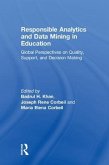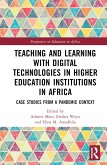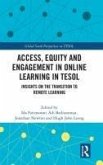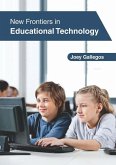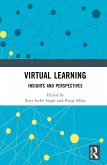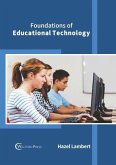Adaptive Educational Technologies for Literacy Instruction
Herausgeber: Crossley, Scott A; McNamara, Danielle S
Adaptive Educational Technologies for Literacy Instruction
Herausgeber: Crossley, Scott A; McNamara, Danielle S
- Gebundenes Buch
- Merkliste
- Auf die Merkliste
- Bewerten Bewerten
- Teilen
- Produkt teilen
- Produkterinnerung
- Produkterinnerung
Adaptive Educational Technologies for Literacy Instruction presents actionable information to educators, administrators, and researchers about available educational technologies that provide adaptive, personalized literacy instruction to students of all ages.
Andere Kunden interessierten sich auch für
![Responsible Analytics and Data Mining in Education Responsible Analytics and Data Mining in Education]() Responsible Analytics and Data Mining in Education197,99 €
Responsible Analytics and Data Mining in Education197,99 €![Creating Design Knowledge in Educational Innovation Creating Design Knowledge in Educational Innovation]() Creating Design Knowledge in Educational Innovation198,99 €
Creating Design Knowledge in Educational Innovation198,99 €![Teaching and Learning with Digital Technologies in Higher Education Institutions in Africa Teaching and Learning with Digital Technologies in Higher Education Institutions in Africa]() Teaching and Learning with Digital Technologies in Higher Education Institutions in Africa174,99 €
Teaching and Learning with Digital Technologies in Higher Education Institutions in Africa174,99 €![Access, Equity and Engagement in Online Learning in TESOL Access, Equity and Engagement in Online Learning in TESOL]() Access, Equity and Engagement in Online Learning in TESOL198,99 €
Access, Equity and Engagement in Online Learning in TESOL198,99 €![New Frontiers in Educational Technology New Frontiers in Educational Technology]() New Frontiers in Educational Technology159,99 €
New Frontiers in Educational Technology159,99 €![Virtual Learning Virtual Learning]() Virtual Learning174,99 €
Virtual Learning174,99 €![Foundations of Educational Technology Foundations of Educational Technology]() Foundations of Educational Technology151,99 €
Foundations of Educational Technology151,99 €-
-
-
Adaptive Educational Technologies for Literacy Instruction presents actionable information to educators, administrators, and researchers about available educational technologies that provide adaptive, personalized literacy instruction to students of all ages.
Hinweis: Dieser Artikel kann nur an eine deutsche Lieferadresse ausgeliefert werden.
Hinweis: Dieser Artikel kann nur an eine deutsche Lieferadresse ausgeliefert werden.
Produktdetails
- Produktdetails
- Verlag: Taylor & Francis Ltd (Sales)
- Seitenzahl: 310
- Erscheinungstermin: 7. Juli 2016
- Englisch
- Abmessung: 216mm x 140mm x 19mm
- Gewicht: 531g
- ISBN-13: 9781138125438
- ISBN-10: 1138125431
- Artikelnr.: 44147830
- Herstellerkennzeichnung
- Libri GmbH
- Europaallee 1
- 36244 Bad Hersfeld
- gpsr@libri.de
- Verlag: Taylor & Francis Ltd (Sales)
- Seitenzahl: 310
- Erscheinungstermin: 7. Juli 2016
- Englisch
- Abmessung: 216mm x 140mm x 19mm
- Gewicht: 531g
- ISBN-13: 9781138125438
- ISBN-10: 1138125431
- Artikelnr.: 44147830
- Herstellerkennzeichnung
- Libri GmbH
- Europaallee 1
- 36244 Bad Hersfeld
- gpsr@libri.de
Scott A. Crossley is Associate Professor of Applied Linguistics at Georgia State University, USA. Danielle S. McNamara is Professor in Cognitive and Learning Sciences and ISTL Senior Investigator at Arizona State University, USA.
1. Educational Technologies and Literacy Development by Scott A.
Crossley and Danielle S. McNamara
2. Challenges and Solutions when Using Technologies in the Classroom by
Amy M. Johnson, Matthew E. Jacovina, Devin G. Russell, and Christian
M. Soto
Section I: Reading and Comprehension Technologies for the Classroom
3. Assessment-to-Instruction (A2i)-An Online Platform for Supporting
Individualized Early Literacy Instruction by Sarah W. Ingebrand and
Carol McDonald Connor
4. Common Core TERA: Text Ease and Readability Assessor by G. Tanner
Jackson, Laura K. Allen, and Danielle S. McNamara
5. Dynamic Support of Contextual Vocabulary Acquisition for Reading
(DSCoVAR): An Intelligent Tutor for Contextual Word Learning by Gwen
A. Frishkoff, Kevyn Collins-Thompson, SungJin Nam, Leslie Hodges, and
Scott A. Crossley
6. Intelligent Tutoring of the Structure Strategy: A Reading Strategy
Tutor by Bonnie J. F. Meyer and Kausalai K. Wijekumar
7. iSTART-2: A Reading Comprehension and Strategy Instruction Tutor by
Erica L. Snow, Matthew E. Jacovina, G. Tanner Jackson, and Danielle
S. McNamara
8. TuinLEC: An Intelligent Tutoring System to Teach Task-Oriented
Reading Skills to Young Adolescents by Eduardo Vidal-Abarca,
Maria-Ángeles Serrano, Luis Ramos, Laura Gil, and Antonio Ferrer
Section II: Writing Technologies for the Classroom
9. Commercialized Writing Systems by Laura K. Allen and Cecile A. Perret
10. The Criterion® Online Writing Evaluation Service by Chaitanya
Ramineni and Paul Deane
11. We-Write: A Web-Based Intelligent Tutor for Supporting Elementary
Classroom Teachers in Persuasive Writing Instruction by Kausalai K.
Wijekumar, Karen R. Harris, Steve Graham, and Bonnie J. F. Meyer
12. The Writing Pal: A Writing Strategy Tutor by Scott A. Crossley, Laura
K. Allen, and Danielle S. McNamara
13. Computer-Assisted Research Writing in the Disciplines by Elena Cotos
14. Writing to Learn and Learning to Write through SWoRD by Christian
Schunn
Section III: Future Technologies for the Classroom
15. Project LISTEN's Reading Tutor by Jack Mostow
16. EMBRACEing Dual Language Learners by Arthur M. Glenberg, Erin A.
Walker, and M. Adelaida Restrepo
17. The Language Muse Activity Palette: Technology for Promoting Improved
Content Comprehension for English Language Learners by Jill Burstein
and John Sabatini
18. The Reading Strategy Assessment Tool: A Computer-Based Approach for
Evaluation Comprehension Processes during Reading by Joseph P.
Magliano, Melissa Ray, and Keith K. Millis
19. Reading Comprehension Lessons in AutoTutor for the Center for the
Study of Adult Literacy by Arthur C. Graesser, Zhiqiang Cai, Whitney
O. Baer, Andrew M. Olney, Xiangen Hu, Megan Reed, and Daphne
Greenberg
20. Udio: Rich and Authentic Literacy Experiences for Struggling Middle
School Readers by Alyssa R. Boucher, Miriam Evans, and Steve Graham
About the Authors
Index
Crossley and Danielle S. McNamara
2. Challenges and Solutions when Using Technologies in the Classroom by
Amy M. Johnson, Matthew E. Jacovina, Devin G. Russell, and Christian
M. Soto
Section I: Reading and Comprehension Technologies for the Classroom
3. Assessment-to-Instruction (A2i)-An Online Platform for Supporting
Individualized Early Literacy Instruction by Sarah W. Ingebrand and
Carol McDonald Connor
4. Common Core TERA: Text Ease and Readability Assessor by G. Tanner
Jackson, Laura K. Allen, and Danielle S. McNamara
5. Dynamic Support of Contextual Vocabulary Acquisition for Reading
(DSCoVAR): An Intelligent Tutor for Contextual Word Learning by Gwen
A. Frishkoff, Kevyn Collins-Thompson, SungJin Nam, Leslie Hodges, and
Scott A. Crossley
6. Intelligent Tutoring of the Structure Strategy: A Reading Strategy
Tutor by Bonnie J. F. Meyer and Kausalai K. Wijekumar
7. iSTART-2: A Reading Comprehension and Strategy Instruction Tutor by
Erica L. Snow, Matthew E. Jacovina, G. Tanner Jackson, and Danielle
S. McNamara
8. TuinLEC: An Intelligent Tutoring System to Teach Task-Oriented
Reading Skills to Young Adolescents by Eduardo Vidal-Abarca,
Maria-Ángeles Serrano, Luis Ramos, Laura Gil, and Antonio Ferrer
Section II: Writing Technologies for the Classroom
9. Commercialized Writing Systems by Laura K. Allen and Cecile A. Perret
10. The Criterion® Online Writing Evaluation Service by Chaitanya
Ramineni and Paul Deane
11. We-Write: A Web-Based Intelligent Tutor for Supporting Elementary
Classroom Teachers in Persuasive Writing Instruction by Kausalai K.
Wijekumar, Karen R. Harris, Steve Graham, and Bonnie J. F. Meyer
12. The Writing Pal: A Writing Strategy Tutor by Scott A. Crossley, Laura
K. Allen, and Danielle S. McNamara
13. Computer-Assisted Research Writing in the Disciplines by Elena Cotos
14. Writing to Learn and Learning to Write through SWoRD by Christian
Schunn
Section III: Future Technologies for the Classroom
15. Project LISTEN's Reading Tutor by Jack Mostow
16. EMBRACEing Dual Language Learners by Arthur M. Glenberg, Erin A.
Walker, and M. Adelaida Restrepo
17. The Language Muse Activity Palette: Technology for Promoting Improved
Content Comprehension for English Language Learners by Jill Burstein
and John Sabatini
18. The Reading Strategy Assessment Tool: A Computer-Based Approach for
Evaluation Comprehension Processes during Reading by Joseph P.
Magliano, Melissa Ray, and Keith K. Millis
19. Reading Comprehension Lessons in AutoTutor for the Center for the
Study of Adult Literacy by Arthur C. Graesser, Zhiqiang Cai, Whitney
O. Baer, Andrew M. Olney, Xiangen Hu, Megan Reed, and Daphne
Greenberg
20. Udio: Rich and Authentic Literacy Experiences for Struggling Middle
School Readers by Alyssa R. Boucher, Miriam Evans, and Steve Graham
About the Authors
Index
1. Educational Technologies and Literacy Development by Scott A.
Crossley and Danielle S. McNamara
2. Challenges and Solutions when Using Technologies in the Classroom by
Amy M. Johnson, Matthew E. Jacovina, Devin G. Russell, and Christian
M. Soto
Section I: Reading and Comprehension Technologies for the Classroom
3. Assessment-to-Instruction (A2i)-An Online Platform for Supporting
Individualized Early Literacy Instruction by Sarah W. Ingebrand and
Carol McDonald Connor
4. Common Core TERA: Text Ease and Readability Assessor by G. Tanner
Jackson, Laura K. Allen, and Danielle S. McNamara
5. Dynamic Support of Contextual Vocabulary Acquisition for Reading
(DSCoVAR): An Intelligent Tutor for Contextual Word Learning by Gwen
A. Frishkoff, Kevyn Collins-Thompson, SungJin Nam, Leslie Hodges, and
Scott A. Crossley
6. Intelligent Tutoring of the Structure Strategy: A Reading Strategy
Tutor by Bonnie J. F. Meyer and Kausalai K. Wijekumar
7. iSTART-2: A Reading Comprehension and Strategy Instruction Tutor by
Erica L. Snow, Matthew E. Jacovina, G. Tanner Jackson, and Danielle
S. McNamara
8. TuinLEC: An Intelligent Tutoring System to Teach Task-Oriented
Reading Skills to Young Adolescents by Eduardo Vidal-Abarca,
Maria-Ángeles Serrano, Luis Ramos, Laura Gil, and Antonio Ferrer
Section II: Writing Technologies for the Classroom
9. Commercialized Writing Systems by Laura K. Allen and Cecile A. Perret
10. The Criterion® Online Writing Evaluation Service by Chaitanya
Ramineni and Paul Deane
11. We-Write: A Web-Based Intelligent Tutor for Supporting Elementary
Classroom Teachers in Persuasive Writing Instruction by Kausalai K.
Wijekumar, Karen R. Harris, Steve Graham, and Bonnie J. F. Meyer
12. The Writing Pal: A Writing Strategy Tutor by Scott A. Crossley, Laura
K. Allen, and Danielle S. McNamara
13. Computer-Assisted Research Writing in the Disciplines by Elena Cotos
14. Writing to Learn and Learning to Write through SWoRD by Christian
Schunn
Section III: Future Technologies for the Classroom
15. Project LISTEN's Reading Tutor by Jack Mostow
16. EMBRACEing Dual Language Learners by Arthur M. Glenberg, Erin A.
Walker, and M. Adelaida Restrepo
17. The Language Muse Activity Palette: Technology for Promoting Improved
Content Comprehension for English Language Learners by Jill Burstein
and John Sabatini
18. The Reading Strategy Assessment Tool: A Computer-Based Approach for
Evaluation Comprehension Processes during Reading by Joseph P.
Magliano, Melissa Ray, and Keith K. Millis
19. Reading Comprehension Lessons in AutoTutor for the Center for the
Study of Adult Literacy by Arthur C. Graesser, Zhiqiang Cai, Whitney
O. Baer, Andrew M. Olney, Xiangen Hu, Megan Reed, and Daphne
Greenberg
20. Udio: Rich and Authentic Literacy Experiences for Struggling Middle
School Readers by Alyssa R. Boucher, Miriam Evans, and Steve Graham
About the Authors
Index
Crossley and Danielle S. McNamara
2. Challenges and Solutions when Using Technologies in the Classroom by
Amy M. Johnson, Matthew E. Jacovina, Devin G. Russell, and Christian
M. Soto
Section I: Reading and Comprehension Technologies for the Classroom
3. Assessment-to-Instruction (A2i)-An Online Platform for Supporting
Individualized Early Literacy Instruction by Sarah W. Ingebrand and
Carol McDonald Connor
4. Common Core TERA: Text Ease and Readability Assessor by G. Tanner
Jackson, Laura K. Allen, and Danielle S. McNamara
5. Dynamic Support of Contextual Vocabulary Acquisition for Reading
(DSCoVAR): An Intelligent Tutor for Contextual Word Learning by Gwen
A. Frishkoff, Kevyn Collins-Thompson, SungJin Nam, Leslie Hodges, and
Scott A. Crossley
6. Intelligent Tutoring of the Structure Strategy: A Reading Strategy
Tutor by Bonnie J. F. Meyer and Kausalai K. Wijekumar
7. iSTART-2: A Reading Comprehension and Strategy Instruction Tutor by
Erica L. Snow, Matthew E. Jacovina, G. Tanner Jackson, and Danielle
S. McNamara
8. TuinLEC: An Intelligent Tutoring System to Teach Task-Oriented
Reading Skills to Young Adolescents by Eduardo Vidal-Abarca,
Maria-Ángeles Serrano, Luis Ramos, Laura Gil, and Antonio Ferrer
Section II: Writing Technologies for the Classroom
9. Commercialized Writing Systems by Laura K. Allen and Cecile A. Perret
10. The Criterion® Online Writing Evaluation Service by Chaitanya
Ramineni and Paul Deane
11. We-Write: A Web-Based Intelligent Tutor for Supporting Elementary
Classroom Teachers in Persuasive Writing Instruction by Kausalai K.
Wijekumar, Karen R. Harris, Steve Graham, and Bonnie J. F. Meyer
12. The Writing Pal: A Writing Strategy Tutor by Scott A. Crossley, Laura
K. Allen, and Danielle S. McNamara
13. Computer-Assisted Research Writing in the Disciplines by Elena Cotos
14. Writing to Learn and Learning to Write through SWoRD by Christian
Schunn
Section III: Future Technologies for the Classroom
15. Project LISTEN's Reading Tutor by Jack Mostow
16. EMBRACEing Dual Language Learners by Arthur M. Glenberg, Erin A.
Walker, and M. Adelaida Restrepo
17. The Language Muse Activity Palette: Technology for Promoting Improved
Content Comprehension for English Language Learners by Jill Burstein
and John Sabatini
18. The Reading Strategy Assessment Tool: A Computer-Based Approach for
Evaluation Comprehension Processes during Reading by Joseph P.
Magliano, Melissa Ray, and Keith K. Millis
19. Reading Comprehension Lessons in AutoTutor for the Center for the
Study of Adult Literacy by Arthur C. Graesser, Zhiqiang Cai, Whitney
O. Baer, Andrew M. Olney, Xiangen Hu, Megan Reed, and Daphne
Greenberg
20. Udio: Rich and Authentic Literacy Experiences for Struggling Middle
School Readers by Alyssa R. Boucher, Miriam Evans, and Steve Graham
About the Authors
Index


